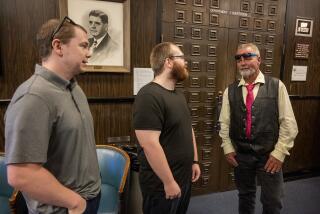A Mother’s Eavesdropping Gets a Conviction Thrown Out
- Share via
SEATTLE — In a victory for rebellious teenagers, the state Supreme Court ruled Thursday that a mother violated Washington’s privacy law by eavesdropping on her daughter’s phone conversations.
Privacy advocates hailed the ruling, but the mother was unrepentant.
“It’s ridiculous! Kids have more rights than parents these days,” said Carmen Dixon, 47. “My daughter was out of control, and that was the only way I could get information and keep track of her. I did it all the time.”
The Supreme Court ruled that Dixon’s testimony against a friend of her daughter should not have been admitted in court because it was based on the intercepted conversation.
The justices unanimously ordered a new trial for Oliver Christensen, who had been convicted of second-degree robbery, in part due to the mother’s testimony.
The case started with a purse-snatching four years ago that shocked the island town of Friday Harbor, population 2,000. Two young men knocked down an elderly woman, breaking her glasses, and stole her purse. Christensen, then 17, was a suspect.
Sheriff Bill Cumming asked Dixon, whose daughter was friends with Christensen, to be alert for any possible evidence.
When Christensen called the Dixon house later, Lacey Dixon, then 14, took the cordless phone into her bedroom and shut the door.
The mother listened in on a speaker phone and took notes on the conversation -- in which Christensen said he knew where the stolen purse was.
The ruling will likely not result in parents being prosecuted for snooping, Cumming said. But it forbids courts and law enforcement from using the fruits of such snooping.
Federal wiretap law has been interpreted to allow parents to record their child’s conversations. But Washington privacy law is stricter. It is one of 11 states that require consent from all parties involved before a conversation can be intercepted or recorded.
“The Washington statute tips the balance in favor of individual privacy at the expense of law enforcement’s ability to gather evidence without a warrant,” Justice Tom Chambers wrote.
That right to individual privacy holds fast even when the individuals are teenagers, the court ruled.
“I don’t think the state should be in the position of encouraging parents to act surreptitiously and eavesdrop on their children,” agreed attorney Douglas Klunder, who filed a brief supporting Christensen on behalf of the American Civil Liberties Union.
Lacey Dixon, now 18, graduated from high school and is attending a massage therapy school, her mother proudly reported. Christensen’s whereabouts are unknown.
Dixon has a 15-year-old son still living at home. She said she sometimes secretly monitors his phone conversations.
She said she would stop.
“If it’s illegal, I won’t do it,” she sighed.
More to Read
Sign up for Essential California
The most important California stories and recommendations in your inbox every morning.
You may occasionally receive promotional content from the Los Angeles Times.













